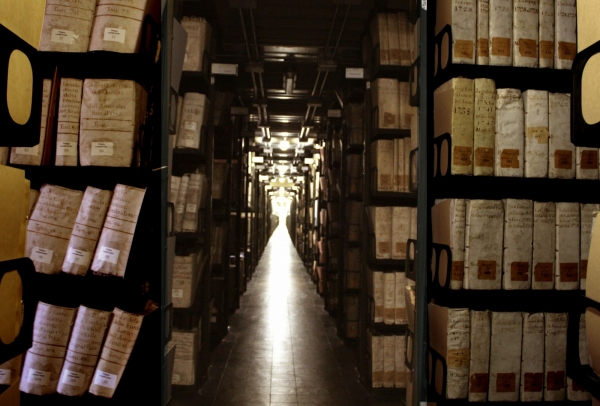National Archives Center-The Keeper of Nation’s Records
Establishment and Role
The government of President Elias Sarkis and PM Salim El-Hoss issued on January 17, 1978 Decree no. 832 stipulating the formation of a public institution called the National Archives Center with a clear objective to regulate and manage national archives and records of any type or form.
Later, Law no. 162 dated December 27, 1999 defined national archives as being a collection of records and documents relating to areas of national intellectual, technical, literary, political, media and administrative heritage that were produced, obtained, collected and preserved by any natural or legal person, public or private, whatever the date, form or content. These archives may be either public or private.
‘Records and documents’ means any written or photocopied document, photograph, film or microfilm, audio or visual recording, whether on tape or on magnetic or optical disks, picture, map or any other material that attests to a certain activity and constitutes a tangible and undisputed reality. When the National Archives Center finds out about heritage-related documents in the possession of any country, international organization, individual, museum or any private or public library, it should take all measures necessary, in coordination with the Ministry of Foreign Affairs, to purchase, recover or obtain copies of these documents.
Decree no. 16527 dated March 8, 2006 abrogated the foregoing Decree no. 832 and stipulated the reformation of the institution under the custody of the Prime Ministry. The National Archives Center was thus classified as a public investment institution responsible for:
- Organizing national records and documents of any type or form, particularly those written material and compilations resulting from the activities of the state, in both private and public sectors, and those of individuals as well as any documents that express the heritage of Lebanon.
- Establishing and keeping a register of publications.
- Issuing an annual bulletin containing a generic overview of every publication.
- Spreading, printing and distributing heritage-related material.
Structure
The National Archives Center is governed by a seven-member board of directors. Members are appointed pursuant to a decree for a three-year term of office. By convention, all major sects should be represented in the board, which is chaired by a full-time Grade 1 Director General who according to the customary norm was also agreed to be Maronite.
The Institution’s General Directorate consists of:
Administrative and Financial Department
- Administrative Office
- Financial Office
- Legal Office
Storage and Safekeeping Department
- Storage Office
- Safekeeping Office
- Technical Office
Studies and Documentation Department
- Studies and Heritage Office
- Library and documentation Office
- PR and Publishing Office
Staff
The National Archives Center staffing structure includes 76 jobs distributed on the following grades:
- Grade 1: 1 post
- Grade 2: 4 posts
- Grade 3: 19 posts
- Grade 4: 39 posts
- Grade 5: 13 posts
Budget
The National Archives Center is allocated an annual budget falling under the budget earmarked for the Prime Ministry. This budget stood at LBP 1 billion in each of 2010, 2011 and 2012.
The functions entrusted with the National Archives Center are much more important than most of the Lebanese could imagine (collecting all written records and documents of both public and private sectors). However, its limited financial means cripple the institution’s ability to realize its full potential and to keep the memory of the Lebanese from being damaged and lost.
Access to documents and archives
The law defined the means by which one may access the national archives as follows:
Those public archives that were accessible to the public before they were deposited at the Center may still be accessed without any restrictions. Regarding the remaining public archives, the Center shall specify a time period during which accessibility would be permissible depending on the type of the archival records, except for the following archives, which may not be accessed until after the expiry of the prescribed time frames:
- Fifty years for those documents carrying information undermining the safety of the nation or relating to private and personal citizen affairs.
- Forty years from the date of verdict delivery or the date of filing or dismissing lawsuits for documents of personal nature.
For purposes of scientific research, the National Archives Center may allow accessibility to public archives before the expiry of the periods established by the law. This can only take place after consulting those who produced the material in question, provided that no harm is caused to public order or to the life of individuals.
Taking into account the content of the foregoing, any person who has been allowed access to the public archives may obtain copies of these records at his/her own expense, provided that he/she does not use them for sheer commercial purposes and that this use does not turn out to be to the detriment of the records. The National Archives Center is also entitled to provide replicas of the requested documents after the Director General approves the authenticity of such replicas. This task may be delegated to a Grade 2 employee.








Leave A Comment